Ken Sim has successfully defeated Kennedy Stewart in a rematch to become the mayor of Vancouver.
He achieved victory with a strong margin, and he’s headed to city hall with strong backing too. According to polls so far, Vancouverites have given Sim an ABC majority on council, school board and park board.
The party was boisterous at South Hall, a banquet venue at the bottom of the city’s south slope by the Fraser River. As soon as the results trickled in with signs of an ABC victory, the crowd of about 500 people put down their chai and samosas to cheer on the party.
This also makes Sim, a Chinese Canadian, the first Vancouver mayor of colour, a milestone of a multicultural city home to a racialized population of 52 per cent.
This is Sim’s first time in elected office.
“The history of this moment isn’t lost on me,” said the Vancouver-born Sim, who nodded to the country’s racist head tax, his Chinese roots and the legacy of other Chinese-Canadian politicians.
“The honour really goes to those whose shoulders I stand on. Douglas Jung. Tung Chan. Raymond Louie. Kerry Jang. David Lam. B.C. Lee, the late B.C. Lee, such a great guy. Art Lee. Sophia Leung. Thank you for paving the way tonight.”
He thanked his late parents, who arrived in Vancouver from Hong Kong in 1967 with $3,200.
“Five-hundred days ago, ABC Vancouver was just an idea.... We are now the largest municipal party in our great province.”
Politics should not be made by “lobbyists, activists or whatever’s trending on Twitter,” said Sim. “Instead, it should be made on the advice of parents, and educators, and scientists, and health-care providers, and what’s happening in community town halls, and coffee shops, and the occasional local pub — seriously some of the greatest ideas come out of a pub.”
Sim, who received a call from Stewart before taking the stage, took a moment to thank the incumbent mayor.
“You were at the helm of the city during one of its darkest times,” said Sim in reference to the pandemic. “On behalf of myself, ABC Vancouver and everyone in Vancouver, we are grateful for your service.”
Sim rattled off his campaign promises to loud cheers: 100 new police officers, 100 new nurses; rejecting a road tax; planting 100,000 trees; increasing accessibility; decreasing permit times on new homes and businesses; expanding drinking in public parks; and bringing back honours classes to schools.
“I do believe our diversity of thoughts and lived experiences make us stronger. I believe we can unite our city again,” said Sim. “I believe we can all work together to reclaim our title of best city in the world.”
ABC’s surge tossed three incumbent councillors from three parties: Melissa De Genova of the NPA, Michael Wiebe of the Greens and Jean Swanson of COPE. As mayor, Sim can expect support from seven elected ABC councillors: Rebecca Bligh, Lisa Dominato, Sarah Kirby-Yung, Mike Klassen, Peter Meiszner, Brian Montague and Lenny Zhou.
ABC not only dominated city council, but had a strong showing on park board and school board as well. Six out of seven park board commissioner seats went to ABC candidates, and five out of nine school trustee seats were won by ABC candidates.
For the park board, Green candidate Tom Digby was the sole non-ABC candidate elected. On the school board, Janet Fraser (Green), Lois Chan-Pedley (Green) and Jennifer Reddy (OneCity) won re-election. They’re joined by Suzie Mah (COPE) and five ABC trustees: Victoria Jung, Alfred Chien, Josh Zhang, Christopher Richardson and Preeti Faridkot.
ABC had a major campaign promise regarding schools: to restore the school liaison officer program, a program that was ended by the previous board after complaints from Black and Indigenous students about bad experiences with the program.
Sim promised that program would be reinstated in a way that acknowledged those complaints.
“The police officers at the schools, they’re willing to modify it to make sure it’s more empathetic and sensitive to racialized communities,” he told The Tyee in a previous interview.
ABC’s campaign director Kareem Allam has a few ideas about how the first-time party pulled off its decisive win.
“It became clear to me how far to the right the NPA had gone, and maybe how far left some of the other traditional liberal-appealing groups had gone,” he said. “There was this wide-open space right in the middle. That’s where we ran our campaign. That’s where we put our platform. That seemed to be the sweet spot this election.”
The party’s internal polling show that the bulk of support, 60 per cent, come from Vancouverites who vote for the Liberals federally, while 20 per cent each comes from NDP and Conservative voters.
He also credits the fact that ABC was able to recruit Rebecca Bligh, Lisa Dominato and Sarah Kirby-Yung, the three incumbent councillors who had ditched the NPA. They’re respected in local communities like arts and business and “brought credibility to the [new] party,” said Allam.
There’s also the work of the candidates and volunteers, said Allam. “The fact of the matter is: we did the work. We went on the ground. We knocked on doors. We went to people’s homes directly, asking them for support.” He credits his playbook to that of former mayors like Mike Harcourt, Gordon Campbell and strategists like Geoff Meggs.
Allam has a story from the campaign that he says encapsulates how people have felt about municipal government in recent years. The party came across a woman who just moved in with her children. She uses a wheelchair, but hasn’t been able to get a renovation permit to widen her bedroom door so that she could enter with it.
“Widening the doorway, it’s not a left or right issue,” he said. “It’s just an issue that needs to be dealt with. And the vast majority of the issues we’re dealing with here at the municipal level are not really ideologically tied.”
Sim came across a few bumps on the campaign trail. Stewart accused Sim of running misleading ads about his position on a road tax, which was eventually taken off air by radio stations. Stewart also successfully exposed Sim for not knowing who the provincial and federal housing ministers were during a debate.
But perhaps the biggest point of controversy for Sim was his endorsement by the Vancouver Police Union. The party said it was “honoured” to receive it, but critics called the endorsement inappropriate as police are supposed to be impartial and have a huge amount of power. It prompted a protest two days before the election that shut down ABC’s campaign office.
That being said, crime and public safety bubbled up as a key election issue due to the increase in stranger attacks and vandalism in some parts of the city. A recent documentary called Vancouver Is Dying pinned this on a “violent” homeless population, featuring a city wracked by open drug use. The documentary argues that the police’s budget should be increased. Its premiere was supported by Pacific Prosperity Network, an organization formed to support right-wing candidates.
ABC, however, didn’t push a pure “law and order” stance. They tempered their promise of hiring 100 new police officers with the hiring of 100 nurses. “We can make Vancouver safe again,” said Sim in one of his campaign videos, a message that appears to have resonated with voters. — Chris Cheung
KENNEDY STEWART: A PROUD CONCESSION
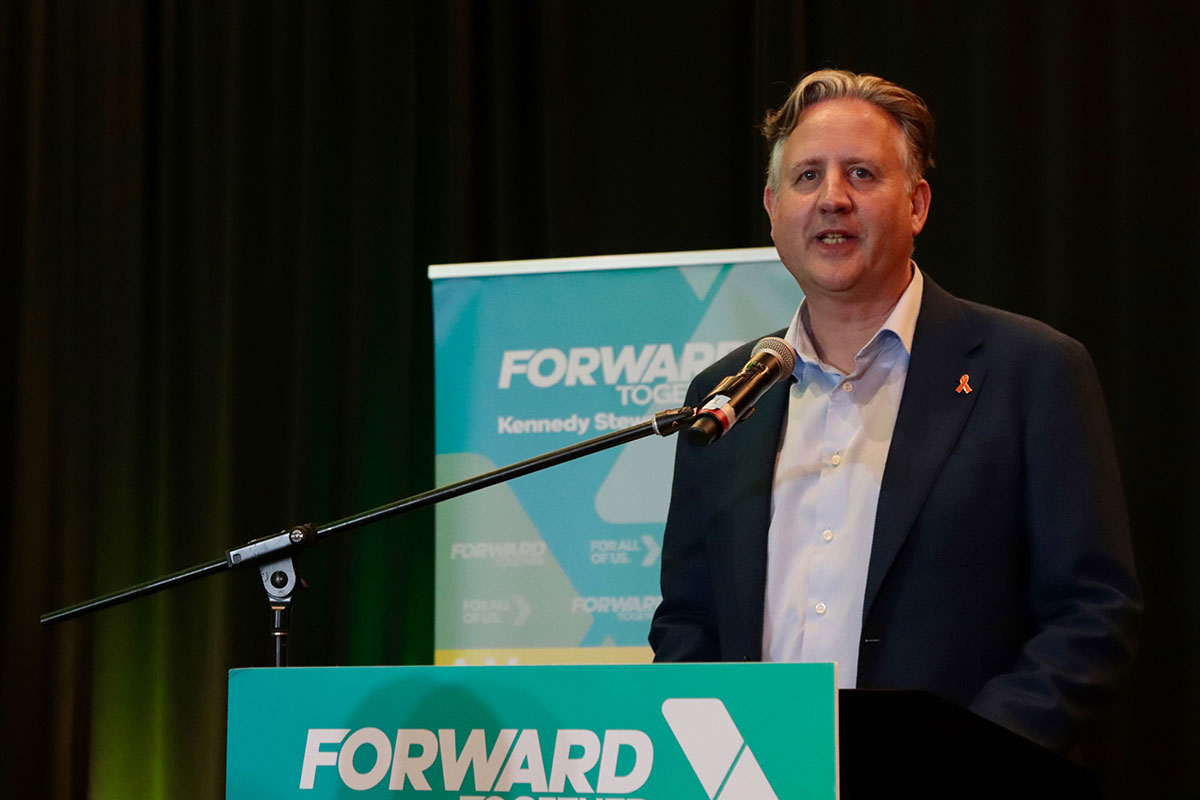
In the quiet just before voting day a poll indicated that Stewart and Sim were in a virtual tie in the race for mayor.
And then a crashing wave of votes rolled in, swamping Stewart and his new party Forward Together. At 10:25 p.m., Stewart took the stage to concede to Sim.
“I’m congratulating him on his victory, which is a solid one — that’s for sure,” Stewart said.
Stewart, a former NDP MP, was elected mayor in 2018 when he ran as an Independent. Stewart told supporters he was proud of his record as mayor.
“I think we've really turned the tide on the housing crisis we have in the city. We've doubled the number of homes that are being approved. We've shifted from building primarily condos for investors to building rental and social housing,” he said.
“On the opioid crisis we became the first major city in Canada to decriminalize drugs.”
“Best four years in the city!” a supporter shouted at one point, possibly an odd thing to say about a period that saw rising homelessness, higher rents and home prices, a worsening overdose crisis — and one of the most challenging periods of the city’s history, the global COVID-19 pandemic.
Some residents complained Stewart was not as visible as other councillors when it came to problems, such as a tent city in Strathcona Park.
With overdose deaths rising sharply as the COVID-19 pandemic dragged on, advocates for drug users praised Stewart for pushing to decriminalize possession of hard drugs.
In 2020, in the midst of a North America-wide focus on police violence and a tight budget because of the pandemic, Vancouver’s council voted to freeze the city’s police budget. That decision was overturned two years later by the province’s director of police services.
While Stewart’s main opponent Sim promised to hire 100 more police officers to deal with safety concerns, Stewart promised to create new outreach teams to help vulnerable people connect with social services. In a controversial move, the Vancouver Police Union endorsed a mayoral candidate this election — and they picked Sim.
To try to form a strong council majority, Stewart formed a new party for the 2022 election and ran with six council candidates, including his wife, Jeanette Ashe, and former communications director Alvin Singh. The party did not run any park board or school board candidates.
As mayor, Stewart touted his relationships with federal ministers, and said those connections had helped to pry loose $1 billion in federal money for new affordable housing projects in the city.
But he presided over a council that was a mix of parties with no clear majority. That led to marathon meetings, jam-packed agendas and unpredictable votes — a situation Stewart acknowledged was a problem during his 2022 campaign for re-election.
“Last year we hit 8,800 [housing unit approvals],” Stewart previously told The Tyee. “If it wasn’t for COVID — and a bananas council — we could have done more.” — Jen St. Denis
THE UNOFFICIAL OPPOSITION IS GREEN
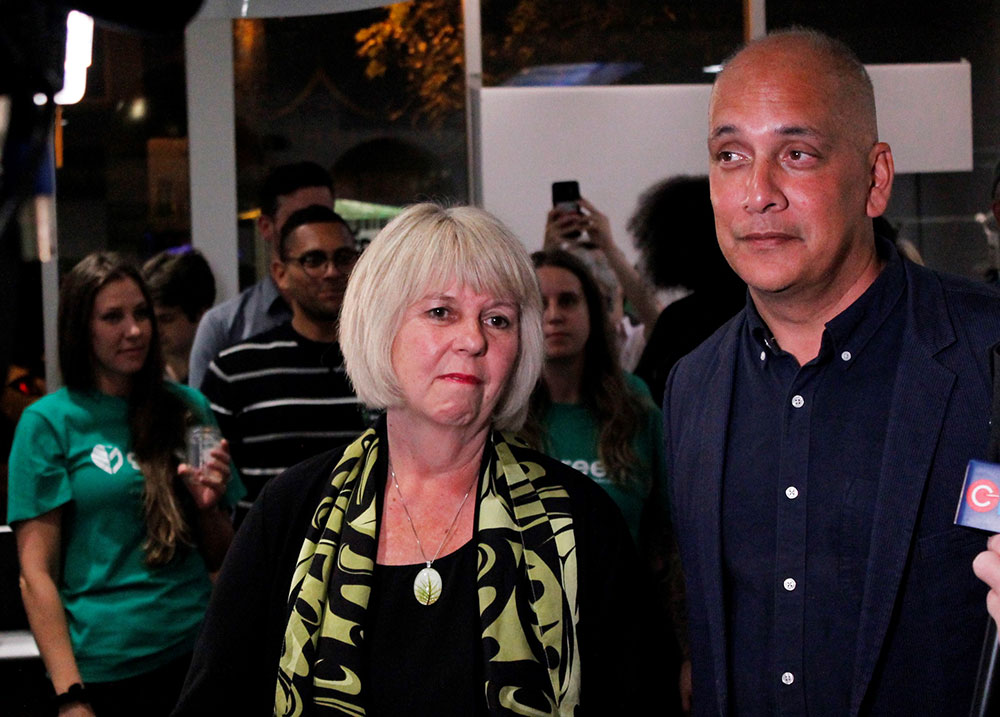
The night at the Vancouver Green Party headquarters began with laughter and ended in tears after one of the party’s three incumbent councillors lost his seat in an election dominated by the centre-right ABC.
Adriane Carr, who won her fourth election for the party, says that makes her and fellow incumbent Pete Fry an unofficial opposition.
Carr said it would be another challenge for a party that tried to act as a force of compromise in the previous council.
“In this case, we’re going to have to make sure that we take the party with the most elected councillors to task,” Carr said after the results were announced.
“It’s going to be a different role, isn’t it?”
She and other Green Party members described it as the end of an election defined by division, and where the more moderate Greens struggled to make themselves heard in sharp differences on issues like housing and homelessness.
“We’ve got nicknames. COPE-Green Alliance. One Green City. Green NPA. AGCG. There’s a lot of comments where people challenge the Greens for working with another side,” council candidate Michael Wiebe said before results were announced.
“The Greens are the ones making the reasonable choice in the middle, which makes people on the two extremes both hate us.”
Wiebe did not win re-election Saturday, something that clearly rocked the party faithful.
The mood at headquarters was at first jovial, more a kitchen party than a campaign event. Carr, Vancouver’s longest-serving councillor, danced to ABBA’s “Dancing Queen,” waving a party sign over her head. Volunteers and candidates danced, laughed and sipped craft beer while a speaker blared oldies and R&B. Candidates stayed in a backroom with prosecco on ice. A sign in the building’s small kitchen showed the Wi-Fi password for the cannabis dispensary next door.
But when the results came in and hope and time ran out, it was clear Wiebe was not close enough to win.
He said he leaves the job proud of the role he played on council. He warned ABC’s dominance would make the role of outside parties that much more important.
“When I walk around this city, I already see all the work I’ve done to make it better,” Wiebe said after results were announced.
The Green Party ran on a platform focused on streamlining applications for greener housing and amending local building codes to allow solar panels on homes.
They also pushed to redefine the definition of “affordable” rentals by basing them on 30 per cent of renters’ income and not the market rate. The party favours changing zoning codes to allow for more non-market housing, such as co-operatives.
Volunteers say what often draws them to the Greens are the party’s atmosphere and its focus on compromise. Campaign staff noted their resources and budget paled to some of their more well-financed opponents.
“I volunteer for the Greens because I genuinely think they are solutions-oriented people,” Tim Marskell said.
“I don’t find them to be ideologues… they’re much more focused on solutions. I don’t find them vacuous, either, just straddling the centre.”
Fry said he purposely stayed off social media on the last day of the campaign. The incumbent councillor says he has been frustrated by the outpouring of anger online. Many, he said, have been overly critical of the previous council, ignoring that three of their four years in office coincided with the COVID-19 pandemic.
“Over the course of this campaign, it’s been sad that folks don’t recognize the context we’re coming out of,” Fry said before results were announced. He expressed hope the Green’s politics still had currency outside of Twitter.
“That consensus-based thing, I think, it still works. It works in real life. It doesn’t work in the corridors of social media,” Fry said. — Zak Vescera
TEAM’S HARDWICK: ‘I’M VERY DESPAIRING’
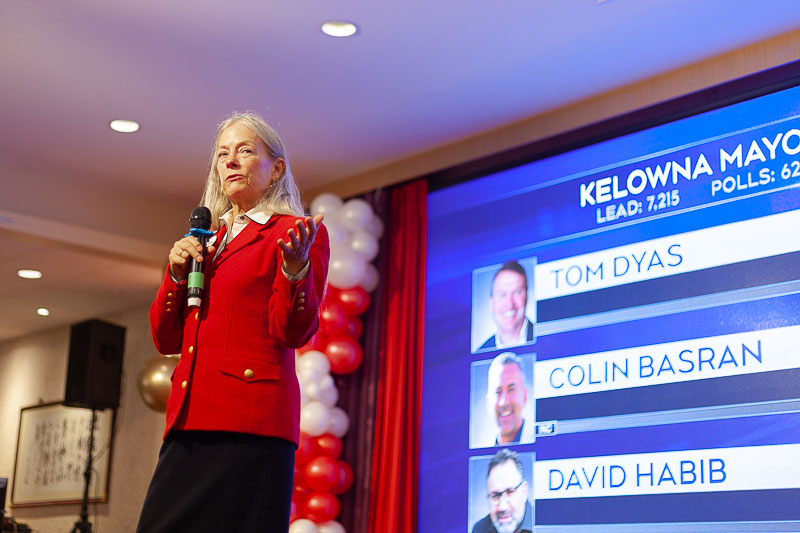
Colleen Hardwick developed a reputation over the past four years on city council for voting “no” or abstaining on high-profile motions ranging from highrises to climate change.
Tonight voters turned it back on Hardwick — and her TEAM for a Livable Vancouver slate of 13 council, park board and school board candidates. They voted "no” to TEAM’s plan to provide affordable housing without rezoning or towers; furthering reconciliation with Indigneous nations despite Hardwick questioning whether that’s a municipal responsibility; and hiring more cops to respond to a rise in assaults in some parts of the city.
“I’m very despairing at this moment,” Hardwick told The Tyee about losing to ABC Vancouver’s Ken Sim. “Not a lot of hope for the future of the city of Vancouver.”
Hardwick attributed the ABC candidates’ success to the $1.6 million the party raised and their significant ad buys.
“I don’t hold out a lot of hope right now, and I know a lot of people are considering leaving,” she said. “I didn’t want to be the last generation in my family to be able to afford to live in Vancouver. I think this is just another nail in the coffin of people who are being pushed out of the city.”
Despite starting on council in 2018 with the right-of-centre NPA, which she left in April 2021 after a series of party scandals, Hardwick maintains she is a “left-of-centre” politician, a federal Liberal in a city councillor’s clothing.
During a speech before the poll numbers started rolling in on Saturday night, Hardwick told TEAM candidates and supporters gathered at the Pink Pearl Chinese seafood restaurant in East Vancouver that TEAM is “pan partisan,” with the most demographically diverse slate in the election.
But critics viewed Hardwick as more conservative, a label she maintains the media and her opponents have gotten wrong about her and TEAM.
“I feel like I’m walking around with a target on my back,” Hardwick said of the backlash she has faced for both her council record and her campaign.
“But we’ve never stopped. We’ve treated people how we want to be treated.”
It’s well known TEAM for a Livable Vancouver took its cues from the original municipal TEAM (The Electors' Action Movement) party, started by her father, Walter Hardwick, in the late 1960s, which had representatives on council into the 1970s.
Where her dad helped develop False Creek south with lowrise co-ops, condos and rental units, Hardwick pledged to continue his legacy by investing $500 million into developing another 2,000 co-op units and extending vacancy controls across the city to protect renters.
However, Hardwick argued the answers to the city’s housing woes lay in gathering data, consulting communities and only greenlighting housing developments in areas already zoned for them, as she believes that “upzoning” for more much more density is what drives up land and housing prices. While on council Hardwick maintained the city’s current pledge of building 72,000 housing units over a decade should be decreased by 60 per cent.
Hardwick, who was born and raised in Vancouver and lives in her family’s $4.5-million single family home in Kits Point, has been most popular with homeowners and renters concerned about the rate of change in Vancouver.
She spoke out against building towers, which she defines as any housing development with an elevator, and in favour of “missing middle” units like multiple units in a single family unit. Although, Hardwick also spoke out against strata-run housing, including condos and townhomes, for inflating housing costs.
TEAM For a Livable Vancouver’s slate this election included lobbyist, provincial NDP insider (and former Tyee columnist) Bill Tieleman, as well as Cleta Brown, a council candidate whose mother, Rosemary Brown, was the first Black woman elected as an MLA in the province. But the other candidates, while engaged in their communities, were essentially political newcomers.
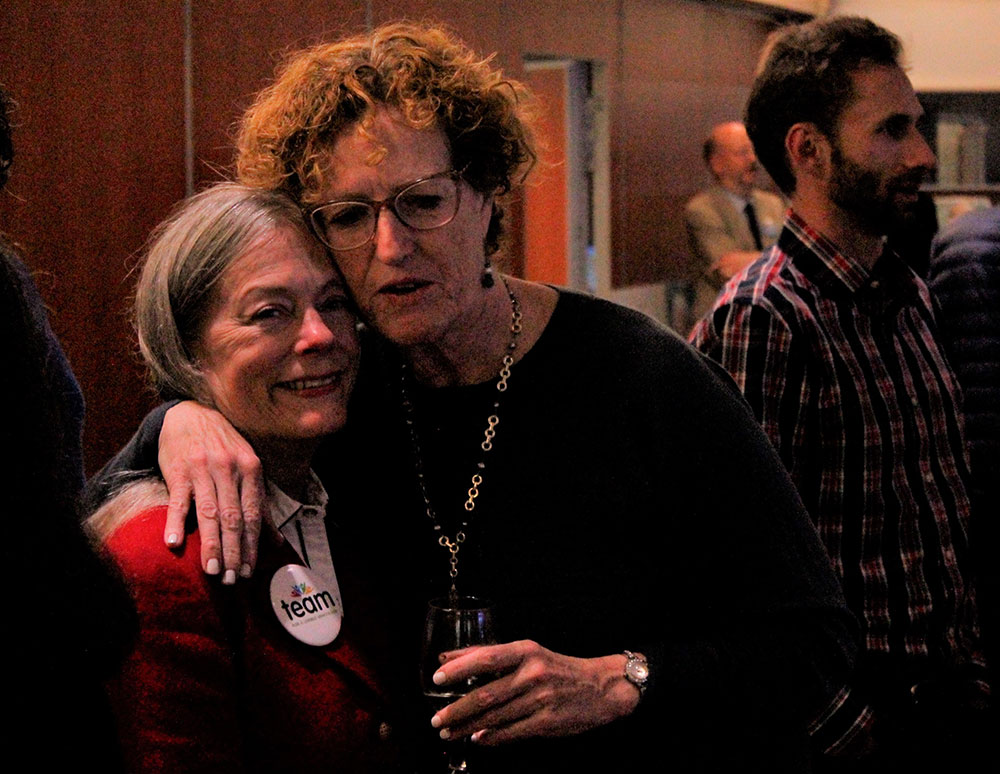
Despite only serving one term on council before running for mayor, Hardwick has been dreaming of becoming the city’s “first lady mayor” for over four decades.
Tonight, those dreams were dashed, but Hardwick said she had no regrets about not running again for a council seat.
“I know after having spent the last four years on council, essentially as a solo act, that it’s an unpleasant experience and in order to be able to course-correct the city a majority was required,” Hardwick told The Tyee.
“Sadly the majority that was elected tonight do not have the background knowledge or experience to affect that turnaround.” — Katie Hyslop
FOR ONECITY, ONE COUNCILLOR
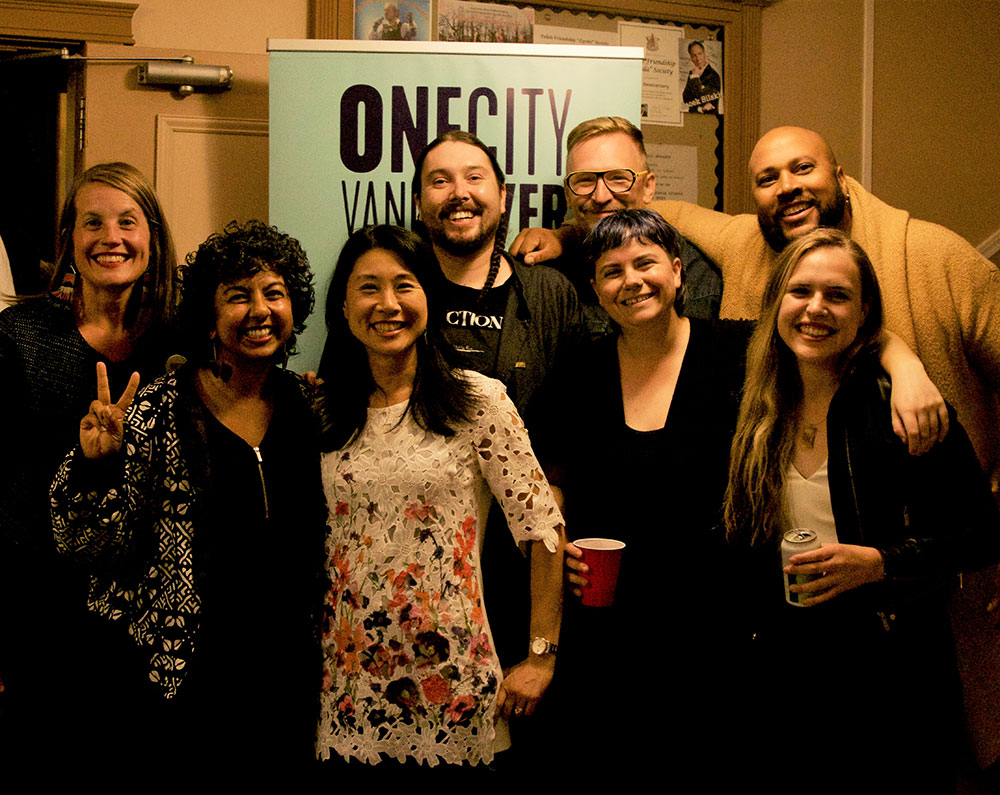
Christine Boyle squeezes into council but, after a resounding defeat for the 12-candidate OneCity slate, will only be joined by school board trustee Jennifer Reddy.
Boyle, who was running for a second term, won with 11,000 votes. None of her fellow candidates for council or park board won a seat.
OneCity did not run a mayoral candidate, Boyle telling The Tyee that they’d placed their bets on a council stacked with a number of their left-of-centre candidates.
Matthew Norris was one of them. A member of Lac La Ronge Nation and president of the Urban Native Youth Association, Norris was hoping that this would be an important step towards decolonization. On election night, before results came in, he told The Tyee that a potential defeat does not mean a loss.
“We’ve still got work to do,” said Norris. “We’re not gonna change hundreds of years of colonization in a night. This is just an incremental gain that will hopefully make it easier for Indigenous candidates in the future. And that’s a win.”
Boyle, who was hoping that the next term would be less fractious than the last, said that even though she did not manage to stack council she nevertheless plans to push ahead with her progressive policies.
“The challenges facing Vancouver are too huge to spend four more years delaying action,” said Boyle. “Whoever is at the table, my focus is addressing challenges at our doorstep.”
OneCity’s platform highlights included eliminating public hearings, prioritizing social housing and building "six-storeys and a corner store" in every neighborhood of the city.
She also said that her retaining OneCity’s lone council seat is nevertheless a victory.
“In this chaotic election, Jen and I returning to office with our ambitious mandate is a success,” she said. — Kate Helmore ![]()
Read more: Municipal Elections 2022, Municipal Politics




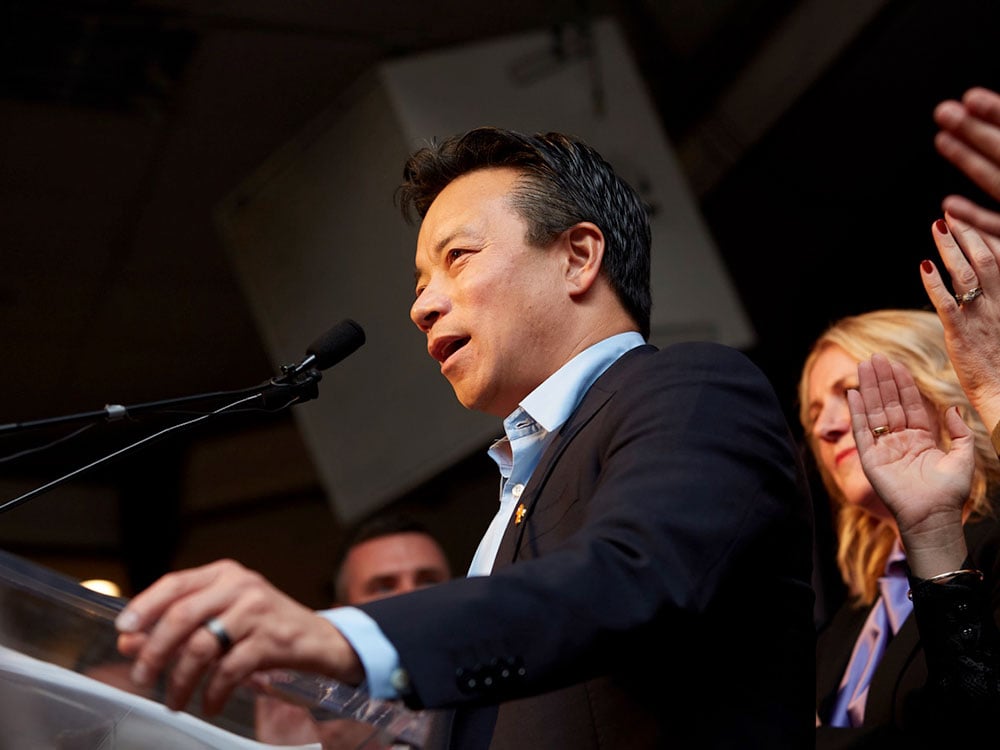












Tyee Commenting Guidelines
Comments that violate guidelines risk being deleted, and violations may result in a temporary or permanent user ban. Maintain the spirit of good conversation to stay in the discussion.
*Please note The Tyee is not a forum for spreading misinformation about COVID-19, denying its existence or minimizing its risk to public health.
Do:
Do not: